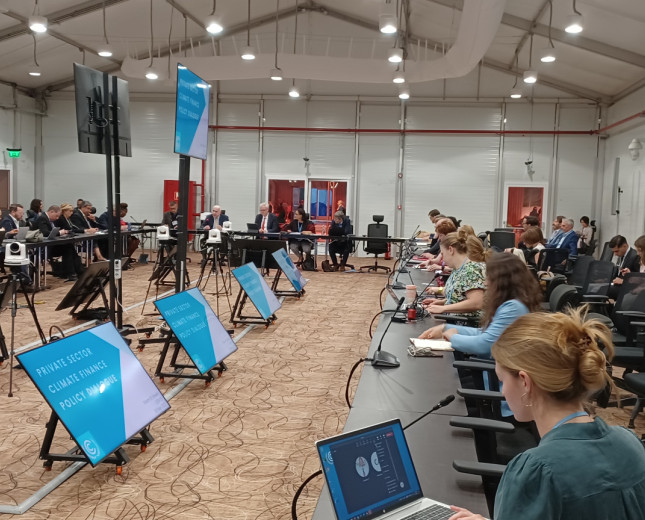The second Private Sector Climate Finance Policy Dialogue at COP27 brought together climate policy and private sector finance leaders in an informal setting to share understanding and awareness of national climate priorities and private sector perspectives on climate finance. Discussions centered around three topics: the New Collective Quantified Goal (NCQG), adaptation and Loss and Damage finance, and Net-zero commitments and implementation pathways (Net-0).
Attended by 45 participants, 26 from the private sector and 19 from the public sector from developed and developing countries. Representation from the private sector included investors asset managers, pension funds, private funds, and some banks.
Moderated by Ambassador Diann Black-Layne (Antigua & Barbuda) and Mr. Jay Collins, Vice Chairman Banking Capital Markets (Citi Group) they underlined the importance of building understanding between the private and public sector climate finance needs.
The Co-Chairs of the NCQG, provided a briefing on the Technical Expert Dialogues in 2022, where participants had emphasized the important role of the private sector in both the process of setting the goal and mobilizing climate finance. However there remains differing views on the extent and function of the private sector. Although the private sector is not accountable to the Convention and the Paris Agreement, they are essential.
The need to discuss implementation and scope of Article 2.1 (c) of the Paris Agreement was stressed, as it is a fundamental part of the involvement process of the private sector. Transparency came out as an important theme as well. It was highlighted that a roadmap for the financial system must be created and stewarded by a reformed and repurposed international financial architecture, to deliver as orderly and just a transition as possible.
It was noted that the finance sector is one of the most regulated sectors. They respond to finance ministries who in turn are empowered by the international financial architecture. There is a need to reassess the international financial architecture, with climate embedded in its core design as most of it does not consider how to deal with a climate crisis.
Participants mentioned that mandates of all institutions should be reviewed and updated to support and catalyze delivery of an orderly and just transition to achieve the outcomes of the Paris Agreement. Institutions must take the lead in their sectors and report on progress in a transparent and coherent manner.
The private sector highlighted the need for clear public policy signals such as carbon pricing and regulation on fossil fuels to redirect investments into more sustainable activities. Without carbon pricing initiatives with sufficient coverage and price, the risk is that there will be no transition at the scale and pace required. It will continue to be cheaper to pollute than decarbonize.
Climate policy participants, on the other hand, mentioned private sector willingness to invest in developing countries with high market entry costs, particularly for adaptation was an issue for many. They also pointed out that there are sectors particularly vulnerable to climate change that have been ignored by the private sector, for example small-scale agriculture, gender responsive climate action, just transitions and nature-based solutions. They encouraged all financial actors to get involved, including at an institutional investor’s level and to engage with the local financial sector including microfinance in doing so.
They also emphasized the imbalance of allocation of financial resources in favor of mitigation over adaptation projects, which could be addressed by increasing awareness raising especially amongst the investor community on risks of not addressing and adapting to climate change, in turn the opportunities this may offer.
Discussions reiterated the need for continuous private sector involvement in climate policy to better understand barriers and drivers of private investment, and to clarify the role of private sector in addressing the climate crisis. There was broad consensus that to tackle climate change and mobilize the trillions needed to transition into a sustainable future, closer cooperation between public and private sector finance is unavoidable now.
